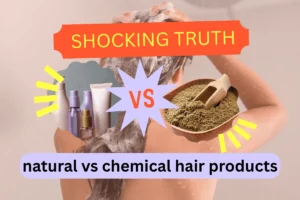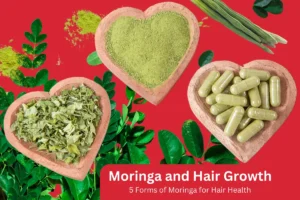From beach days to pool parties, ensure your hair stays stunning. Discover how to care hair in summer, tips on washing, protection, hydration, and home remedies to keep your locks luscious all season long.
Table of Contents
Introduction
Summertime’s intense heat and humidity may be damaging to hair. If you don’t take adequate care of your hair throughout the summer, it might look drab from frizz to dryness. But do not worry! All summer long, you can maintain healthy, moisturised, and gorgeous hair with the correct techniques and methods.
Impact of Summer on Hair
The summer season is all about the sunshine, vacations, and fun. However, it can have various impacts on hair due to increased exposure to sunlight, heat, humidity, and activities such as swimming. Before knowing how to care hair in summer it is important to know the impact of summer on hair.
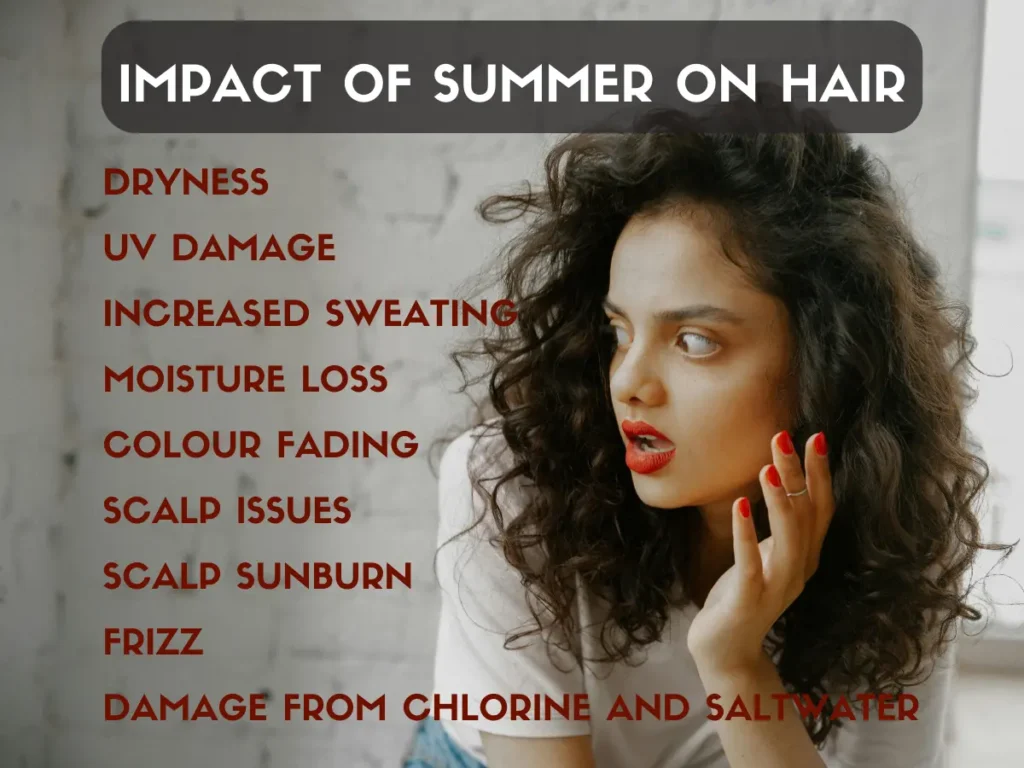
- Dryness: Heat and sun exposure can deplete hair’s moisture content, resulting in frizz, brittle hair, and dryness.
- UV Damage: Long-term exposure to ultraviolet (UV) radiation can harm the cuticle of hair, resulting in discolouration, weakened hair strands, and an elevated risk of breaking.
- Moisture loss: Heat waves can dehydrate you, affecting your hair and scalp.
- Frizz: In Summertime high humidity levels can make hair absorb too much moisture from the atmosphere, resulting in frizz and an unruly texture, especially for people with curly or wavy hair.
- Increased sweating: Sweating, especially on oily scalps, can make hair feel greasy and floppy.
- Colour Fading: Coloured hair, exposure to the sun can cause hair colour to fade, giving the appearance of dullness.
- Scalp Issues: During the summer, problems like dandruff and scalp irritation can get worse due to sweating and increased oil production on the scalp.
- Damage from Chlorine and Saltwater: Natural oils in hair can be stripped by chlorine from swimming pools and saltwater from the beach, resulting in dryness, brittleness, and discolouration.
- Scalp Sunburn: The scalp can get sunburned, especially in those with thinning hair.
How to Care Hair in Summer – 13 Important Tips for Summer Hair Care
You must shield your hair from direct sunshine and humidity throughout the summer. Here are a few useful important tips for summer hair care.
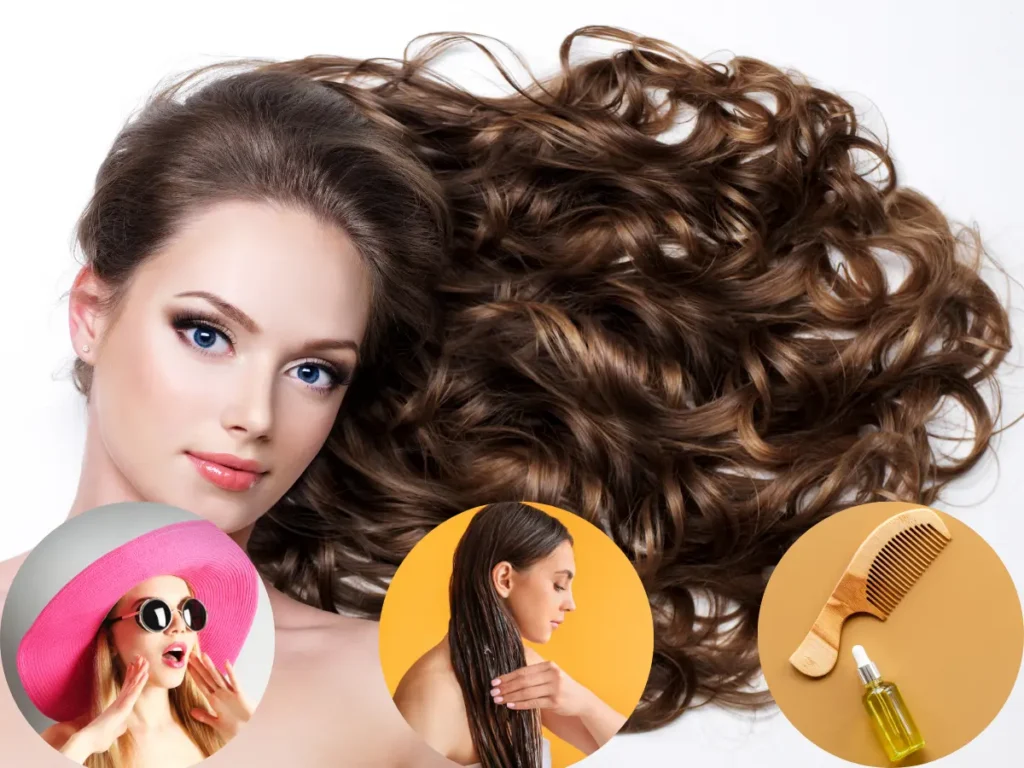
- Hydrate Regularly: You should hydrate your hair every day. Drink plenty of water to keep your hair hydrated from within. This keeps hair strong and elastic and supports the health of the scalp.
- Use UV Protection: Use SPF-containing hair care products to protect your hair from damaging UV rays, and when you spend a lot of time outside in the sun, cover up with a hat or scarf.
- Moisturize: To fight dryness brought on by heat and sun exposure, use high-quality moisturising shampoo and conditioner to restore moisture that has been lost.
- Limit Heat Styling: Minimise using hot styling products like curling irons, blow dryers, and straighteners because they can cause additional damage and dry up your hair.
- Trim Regularly: Schedule a routine haircut to avoid split ends and maintain healthy, manageable hair.
- Protective Styles: Wearing protective hairstyles, including buns, updos, or braids, can help limit your exposure to the sun and lower your chance of getting damaged.
- Rinse After Swimming: Rinse your hair with fresh water to get rid of any salt or chlorine residue that could dry out and damage it after swimming in saltwater or chlorinated swimming pools.
- Deep Conditioning: Give your hair a deep conditioning treatment to nourish and heal any damage from the sun, salt, or chlorine.
- Avoid Overwashing: Over-shampooing your hair can cause damage and dryness by removing its natural oils. Washing should only be done 2 or 3 times a week, with a mild shampoo that is appropriate for your hair type.
- Protect Your Scalp: Always use sunscreen or wear a hat to prevent sunburn on your head.
- Healthy diet: Consuming a well-balanced diet full of healthy grains, fruits, and vegetables nourishes your hair from the inside out.
- Use a Wooden Comb: Our hair’s health is directly impacted by the kind of comb we use. Choose wide-toothed hardwood combs over inexpensive plastic ones. These combs are kind to our hair and effectively distribute natural oils over the whole length of our hair.
- Don’t Skip Hair Oil: Your hair and scalp will receive the nutrition they need from mild hair oil without feeling overly greasy.
Natural Remedies for Summer Hair Care: How to Care Hair in Summer
Along with the above-mentioned important tips for summer hair care you can opt for a few natural remedies for summer hair care to keep your hair healthy and beautiful. You can also make the practice of a daily easy hair care routine along with focusing on how to care hair in summer.
1. Coconut Oil as Natural Remedies for Summer Hair Care
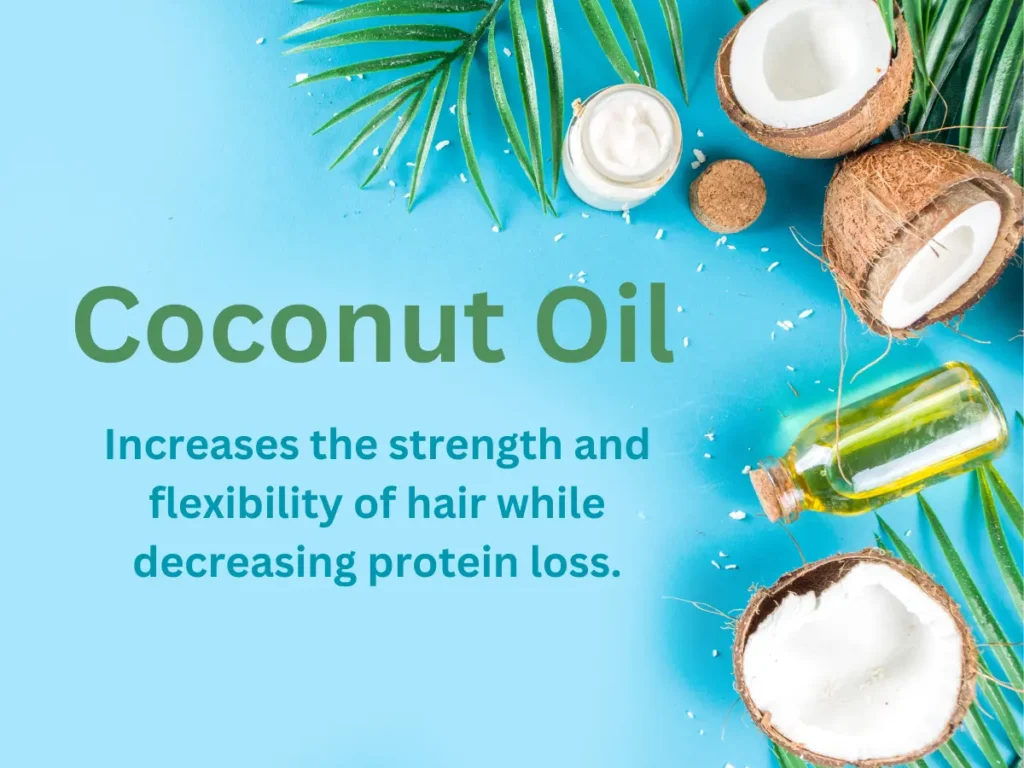
How to Use:
Coconut oil should be slightly warmed before being massaged into your scalp and hair, giving the ends particular attention. For deeper penetration, you can keep it on for at least 30 minutes or overnight. Then wash with shampoo and condition your hair as normal.
Key Nutrients: Coconut oil is rich in medium-chain fatty acids, particularly lauric acid.
Benefits:
Because of its antibacterial qualities, lauric acid may aid in preventing scalp infections and fostering a healthy environment on the scalp. Furthermore penetrating the hair shaft, coconut oil increases the strength and flexibility of hair while decreasing protein loss.
Coconut oil, being a triglyceride of lauric acid (principal fatty acid), has a high affinity for hair proteins and, because of its low molecular weight and straight linear chain, is able to penetrate inside the hair shaft.
Rele AS, Mohile RB. Effect of mineral oil, sunflower oil, and coconut oil on prevention of hair damage. J Cosmet Sci. 2003 Mar-Apr;54(2):175-92. PMID: 12715094.
2. Aloe Vera: Nature’s Best Natural Remedies for Summer Hair Care
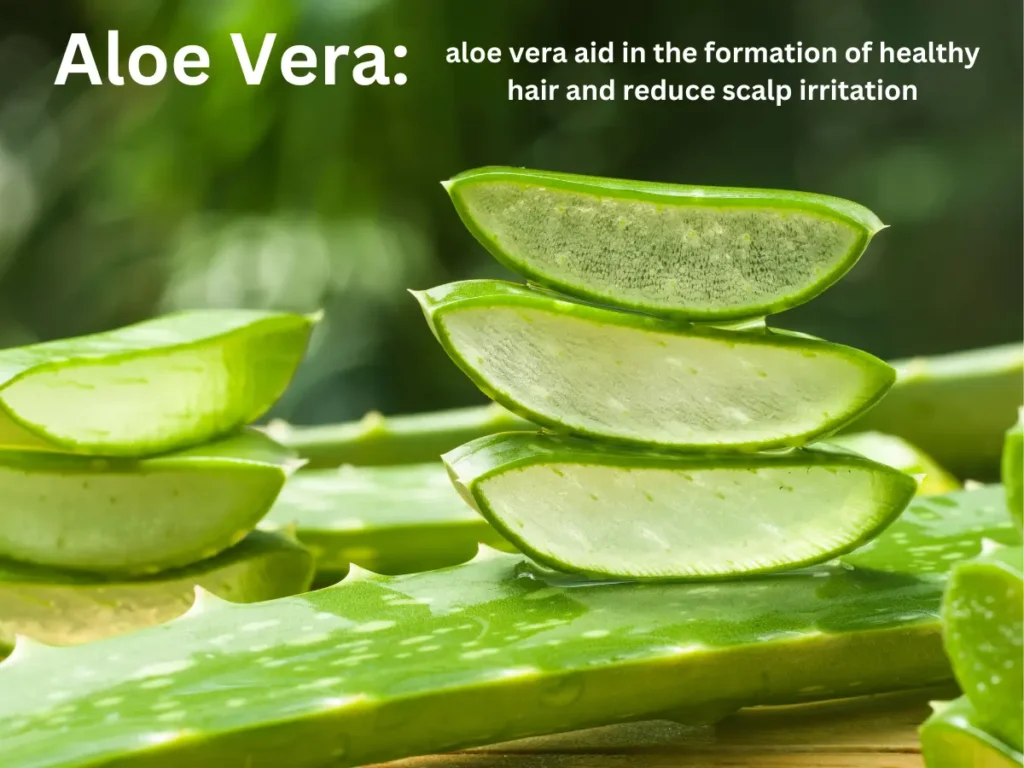
How to Use:
Take fresh aloe vera gel off the plant and massage your scalp and hair with it. Before giving it a quick water or shampoo rinse, let it sit for around half an hour.
Key Nutrients: Aloe vera contains vitamins A, C, and E, as well as various minerals such as zinc and selenium.
Benefits:
Due to the antioxidant qualities of these minerals, oxidative stress and free radical damage to the hair and scalp are prevented. Additional enzymes included in aloe vera aid in the formation of healthy hair and reduce scalp irritation.
3. Apple Cider Vinegar
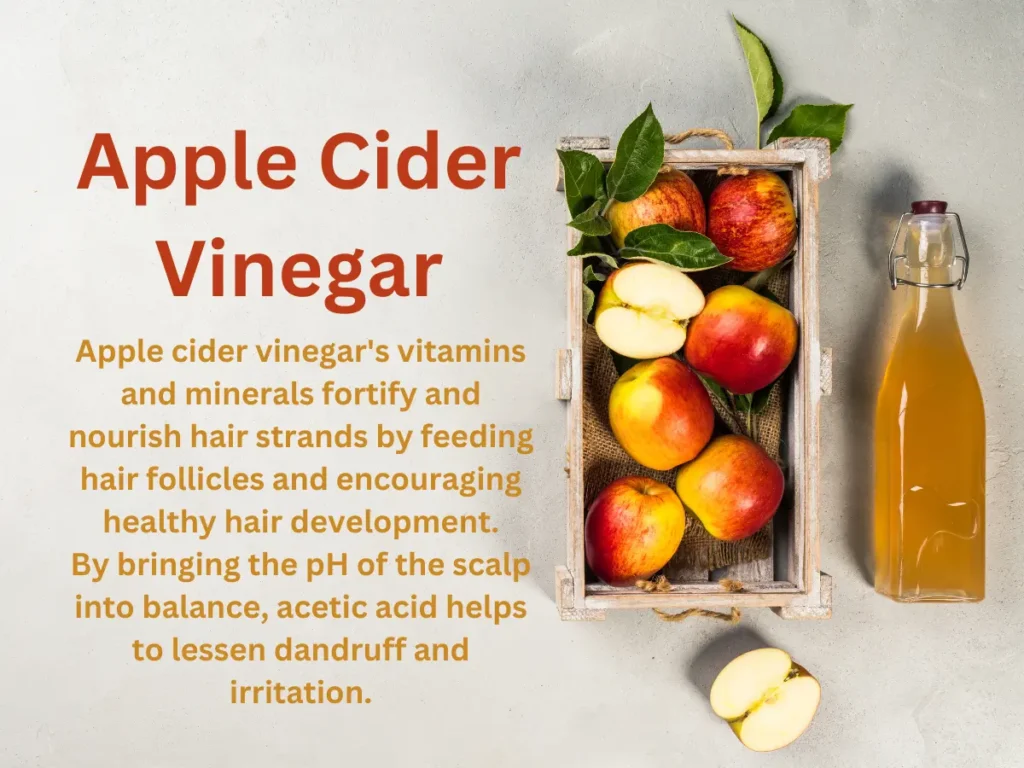
How to Use:
In a bowl, mix equal parts water and apple cider vinegar. Apply the concoction to your hair and work it into your scalp after shampooing. After a few minutes, let it sit and then give it a good water rinse.
Key Nutrients: Apple cider vinegar contains acetic acid, as well as vitamins and minerals like vitamin C, vitamin B, potassium, and magnesium.
Benefits:
By bringing the pH of the scalp into balance, acetic acid helps to lessen dandruff and irritation. Apple cider vinegar’s vitamins and minerals fortify and nourish hair strands by feeding hair follicles and encouraging healthy hair development.
4. Honey Hair Mask
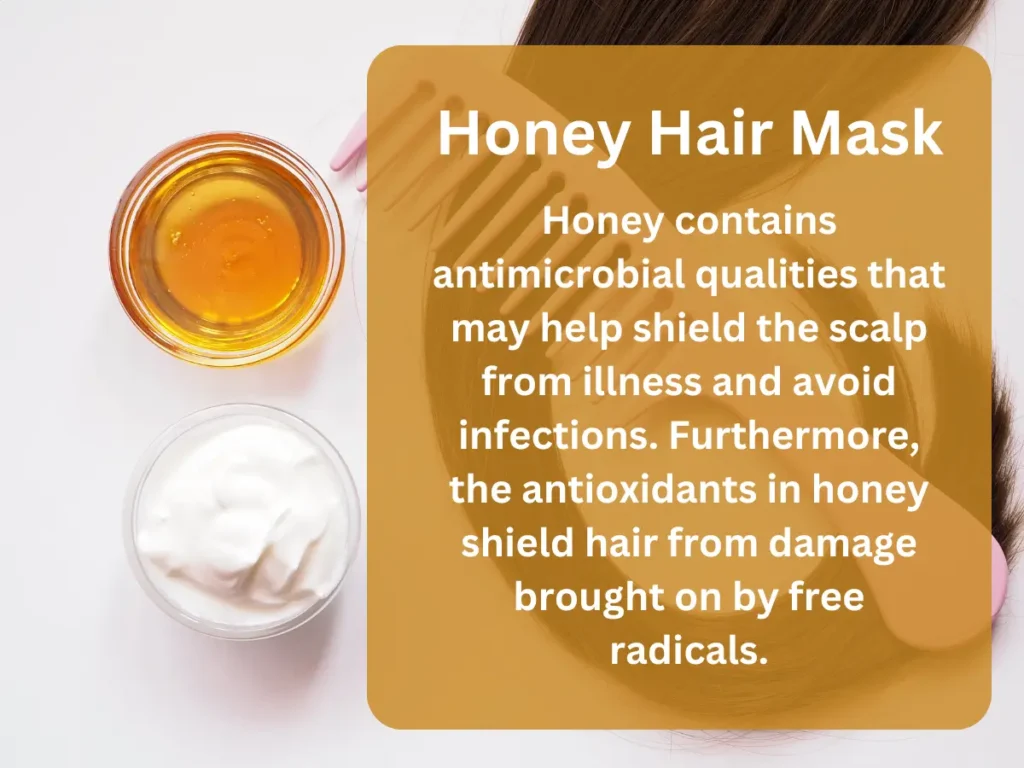
How to Use:
To make a thick paste, mix honey with yoghurt or olive oil. After applying the mask to wet hair, paying particular attention to the ends, let it sit for 20 to 30 minutes, then thoroughly rinse with water.
Key Nutrients: Honey contains vitamins such as vitamin B and vitamin C, as well as minerals like iron, calcium, and magnesium.
Benefits:
Because of its humectant properties, honey draws and holds moisture in the hair. Additionally, it contains antimicrobial qualities that may help shield the scalp from illness and avoid infections. Furthermore, the antioxidants in honey shield hair from damage brought on by free radicals.
5. Avocado
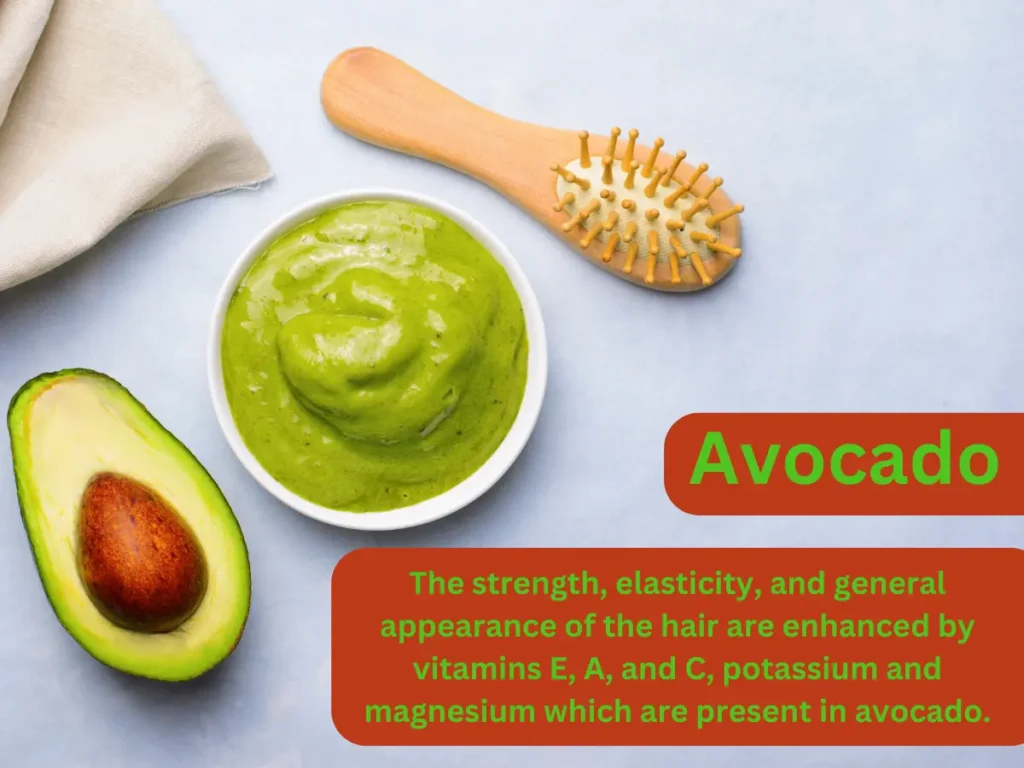
How to Use:
To make a smooth paste, mash a ripe avocado and combine it with a tablespoon of coconut oil or olive oil. After properly cleaning your hair after about 30 minutes, apply the mask to damp hair, paying special attention to the ends.
Key Nutrients: Avocado is rich in vitamins E, A, and C, as well as minerals such as potassium and magnesium.
Benefits:
The strength, elasticity, and general appearance of the hair are enhanced by these nutrients, which also hydrate and nourish it. Healthy fats found in avocados also aid in hydrating the scalp and lowering inflammation.
6. Banana
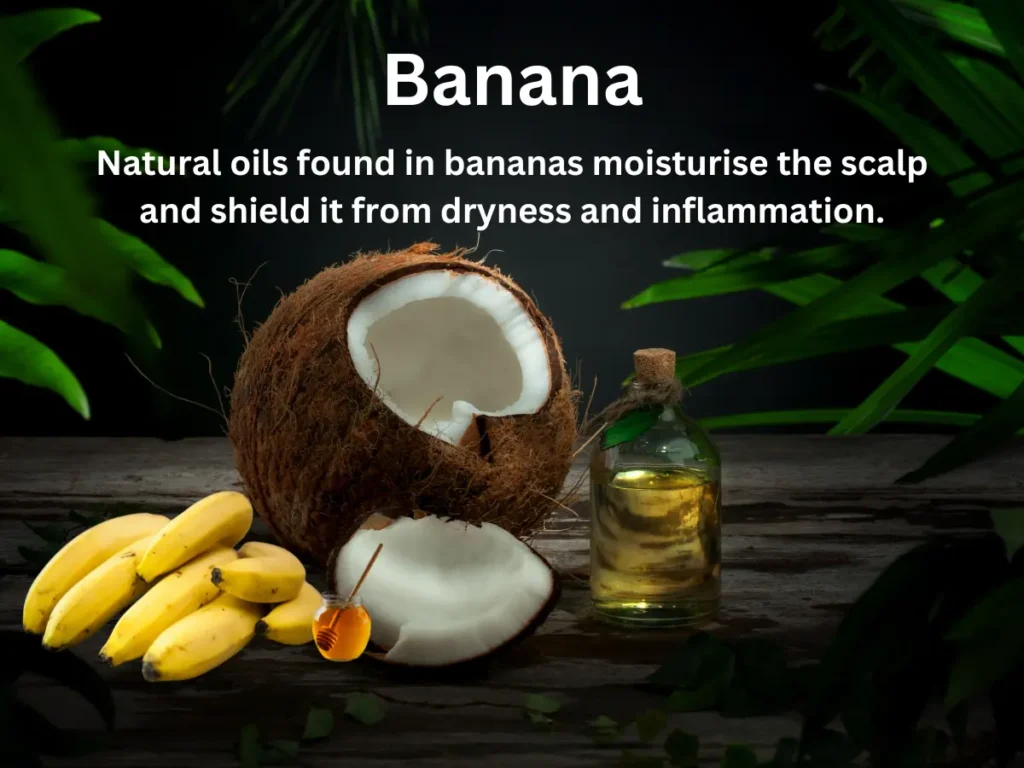
How to Use:
Smoothly blend one tablespoon each of honey and coconut oil with a ripe banana. Focusing on the ends of your damp hair, apply the mask there. Let it sit for about 30 minutes, then completely rinse it off.
Key Nutrients: Bananas contain vitamins A, B, and E, as well as minerals like potassium and zinc.
Benefits:
With moisturising and conditioning the hair, these nutrients lessen frizz and increase manageability. In addition, natural oils found in bananas moisturise the scalp and shield it from dryness and inflammation.
7. Rosewater Spray
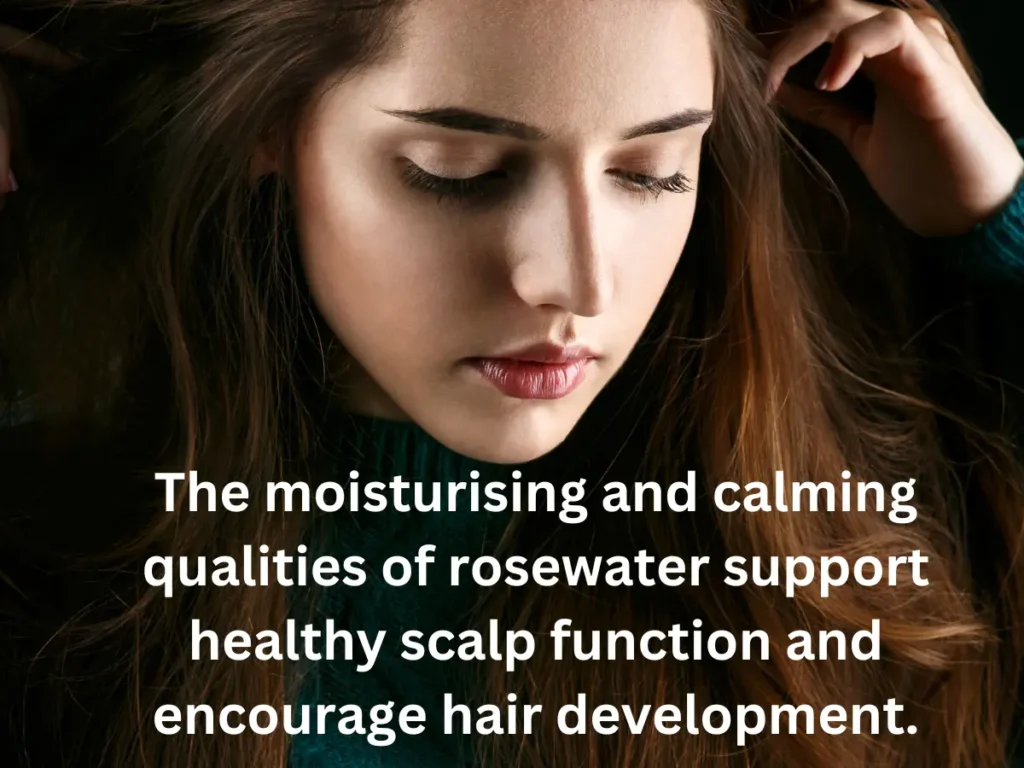
How to Use:
Use an equal amount of rosewater and water in a spray bottle to mist your hair paying particular attention to the mid-lengths and ends.
Key Nutrients: Rosewater contains vitamins A, C, and E, as well as antioxidants like flavonoids and polyphenols.
Benefits:
The minerals and antioxidants in rosewater spray shield the hair from environmental stresses and free radical damage. Additionally, the moisturising and calming qualities of rosewater support healthy scalp function and encourage hair development.
8. Herbs (Rosemary, Lavender, Chamomile)
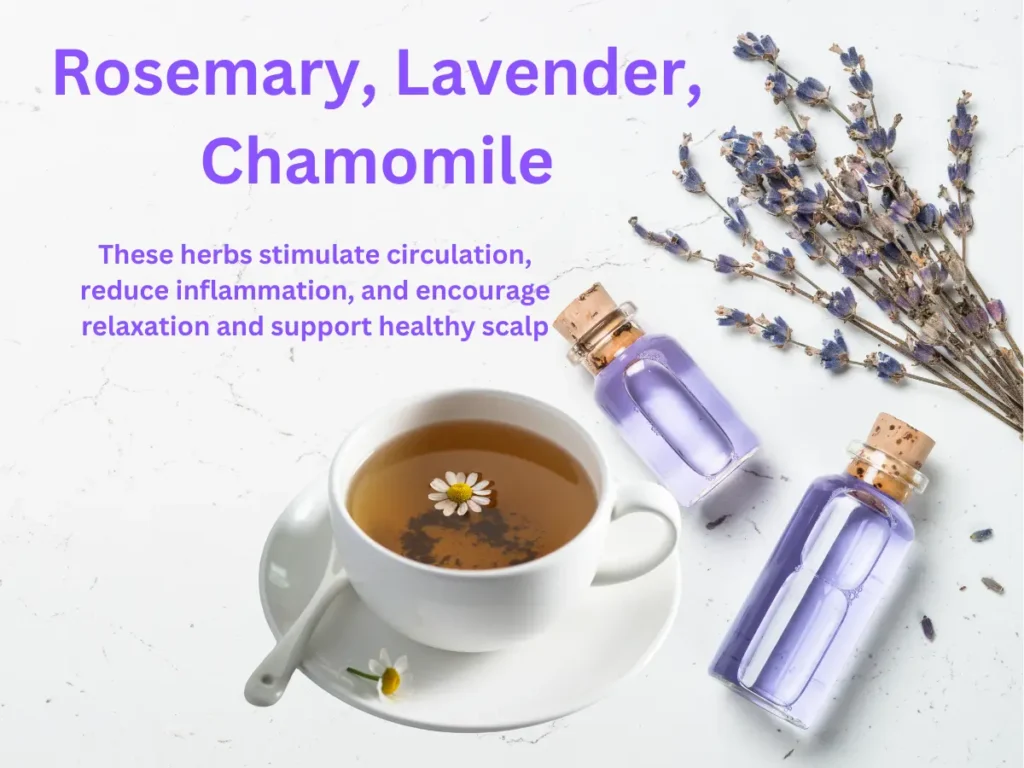
How to Use:
Herbs like chamomile, lavender, or rosemary can be brewed strongly in hot water. Once cooled, drain the mixture and use it as a last rinse to finish off your shampooing process.
Key Nutrients: Herbs like rosemary, lavender, and chamomile contain vitamins, minerals, and antioxidants that promote scalp health and hair growth.
Benefits:
These herbs stimulate circulation, reduce inflammation, and encourage relaxation, among other advantages for hair health. Moreover, they possess antibacterial qualities that support the preservation of a healthy scalp environment.
9. Green Tea
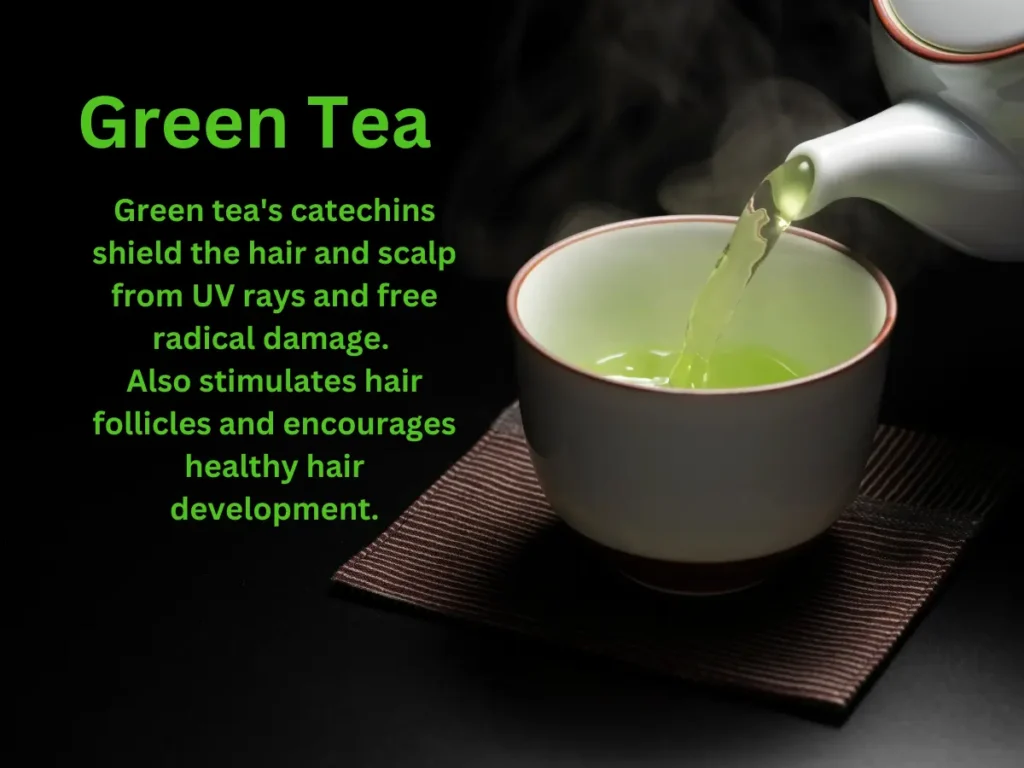
How to Use:
After making green tea, let it cool. After shampooing, use it as a last rinse to fortify hair follicles, lessen shedding, and give your hair more shine.
Key Nutrients: Green tea is rich in antioxidants called catechins, vitamins C and E, and minerals like manganese and zinc.
Benefits:
The anti-inflammatory and antioxidant qualities of green tea’s catechins shield the hair and scalp from UV rays and free radical damage. Caffeine, which stimulates hair follicles and encourages healthy hair development, is another ingredient in green tea.
10. Essential Oils (Lavender, Rosemary, Peppermint)
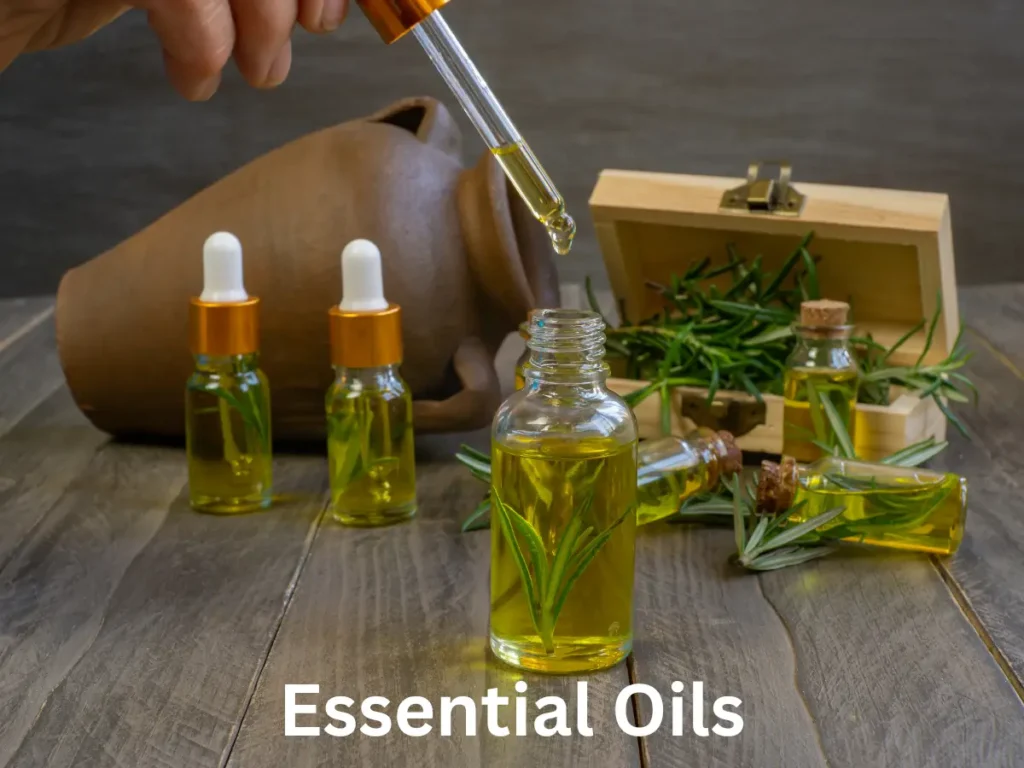
How to Use:
Combine a few drops of essential oils, such as peppermint, lavender, or rosemary, with a carrier oil, like jojoba or coconut oil. After applying the mixture to your scalp for a few minutes in circular motions, let it sit for around half an hour before shampooing.
Key Nutrients: Essential oils contain various compounds, including monoterpenes, sesquiterpenes, and phenolic compounds, that contribute to their therapeutic properties.
Benefits:
In addition to increasing circulation, lowering inflammation, and encouraging relaxation, these essential oils have many other advantages for the scalp and hair. Infections can be avoided and scalp health can be preserved by their antibacterial qualities as well.
Conclusion
Caring for your hair during the summer months, especially with the focus on “How to Care Hair in Summer”, is crucial for preserving its health, hydration, and overall appearance. By adhering to these suggestions and integrating them into your summer hair care regimen, you can ensure your locks remain stunning throughout the entire season.
FAQs
How often should I wash my hair in the summer?
You can wash your hair every 2-3 days or as needed to remove sweat, salt and other impurities.
Can I use regular sunscreen on my hair?
Yes, it’s best to use hair products specifically formulated for UV protection to shield your strands from damage.
Are there any hairstyles that are damaging to hair in the summer?
Tight hairstyles like tight ponytails or braids can cause breakage and damage, especially when combined with sun exposure and heat. Opt for looser styles to minimize damage.
How can I prevent my hair colour from fading in the sun?
Use hair products with UV protection, wear hats or scarves to shield your hair from direct sunlight, and avoid excessive heat styling.
What should I do if my hair feels dry and brittle in the summer?
If your hair feels dry and brittle, focus on hydrating and nourishing treatments like deep conditioning masks, leave-in conditioners, and natural oils to restore moisture and softness.

